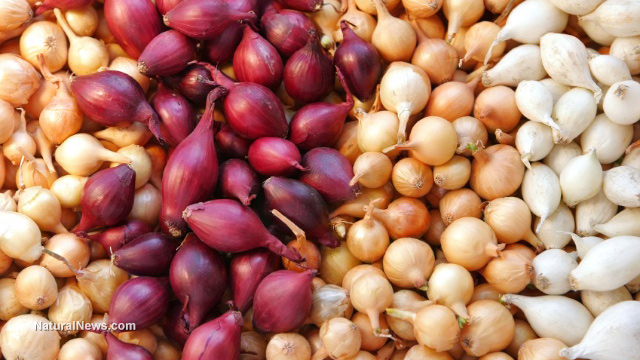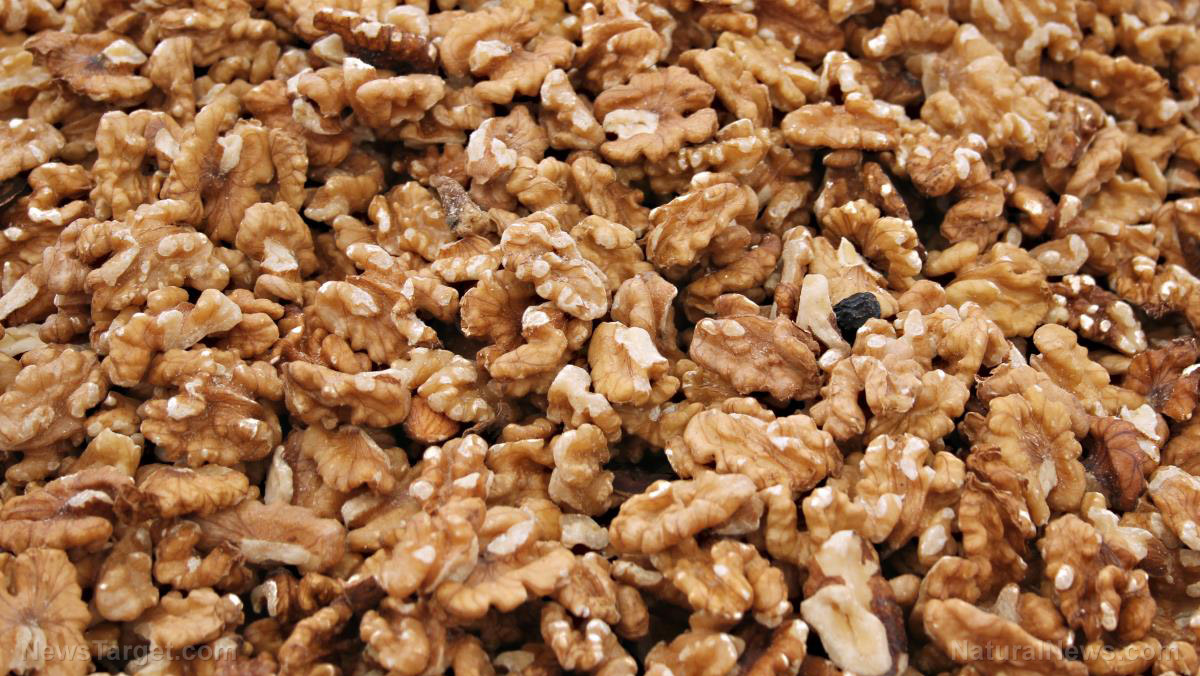 Parler
Parler Gab
Gab
Science-backed health benefits of onions
Onions are packed with an impressive array of phytochemicals, natural compounds produced by plants with numerous health benefits. They contain organosulfur compounds, phenolic compounds (which include flavonoids, lignans, phenolic acids and tannins), polysaccharides and saponins. Studies have shown that onions promote better health in many ways.Bone density
Regularly eating onions may offer significant benefits for bone health, particularly for women going through or having completed menopause. A 2009 study published in Menopause found that women who consumed onions frequently had a 20 percent lower risk of experiencing hip fractures compared to those who never included onions in their diet. This suggests that onions can play a protective role in maintaining bone density when women are particularly susceptible to bone loss. Furthermore, onions have been shown to help combat osteoporosis, a chronic condition that decreases bone mineral density. Research published in Food Frontiers in 2020 highlights the potential of onions to support bone health by addressing the inflammatory processes associated with this condition.Cancer
A study published in Molecular Nutrition & Food found a strong link between Allium vegetable consumption and a lower incidence of this type of cancer. One of the key players in onions is quercetin, which is considered a powerful anticancer agent. According to experts at the University of Maryland Medical Center, quercetin may inhibit cancer cells in various types of tumors, including those found in the breast, colon, endometrium, lungs, ovaries and prostate. The National Onion Association highlights a recent study from the Netherlands, which found that people who consumed onions absorbed twice as much quercetin as those who drank tea and over three times more than those who ate apples, which are also high in quercetin. Among the different varieties, red onions stand out as particularly rich in quercetin, while shallots and yellow onions are also good options. In contrast, white onions have the least amount of quercetin and other antioxidants. A study published in the Asia-Pacific Journal of Clinical Oncology revealed that consuming Allium vegetables is linked to a lower risk of colorectal cancer. Researchers studied more than 800 participants and discovered that those who had higher quantities of Allium vegetables had an almost 80 percent lower chance of developing colorectal cancer compared to those who consumed fewer. Onions may also offer benefits for individuals undergoing cancer treatment. Research published in Integrative Cancer Therapies found that eating yellow onions helped reduce insulin resistance and hyperglycemia in breast cancer patients receiving chemotherapy.Digestion
Onions promote bowel movement regularity and overall good digestion, thanks to their fiber content. One special type of soluble fiber found in onions is called oligofructose, which helps nourish the good bacteria in your intestines. A study published in Clinical Gastroenterology and Hepatology suggests that oligofructose can help prevent and treat certain types of diarrhea – making onions a beneficial addition to your diet when digestive issues arise. Additionally, phytochemicals in onions which help neutralize harmful free radicals, may also lower your risk of developing gastric ulcers, according to the National Onion Association.Eye health
Onions may also have potential benefits for eye health, particularly in combating age-related changes to the cornea. A 2021 study in Anatomy & Cell Biology explored how fresh onion juice could help address structural and functional changes in the cornea, which are common as we age. The study conducted on rats revealed that applying diluted onion juice as eye drops over 12 weeks led to several improvements in the aged rats. These included lower intraocular pressure, increased tear production and the restoration of key layers of the cornea that had deteriorated due to aging. The researchers suggested that these benefits could be due to the antioxidant properties of onion juice, which may help protect eye tissues from damage. They also found that onion juice triggered the activation of key proteins, like epidermal growth factor receptor (EGFR) and paired box protein-6 (PAX6), which are crucial for corneal health. This suggests that onions could help maintain healthy eyes as we age by promoting tissue repair and reducing oxidative stress. Additionally, a 2014 study in Jundishapur Journal of Microbiology found that onion juice may have antimicrobial properties that could inhibit the growth of certain bacteria on the surfaces of the eye. While this effect needs more research, it points to the potential of onion juice to help common eye infections, like blepharitis (inflammation of the eyelids) and conjunctivitis (also known as "pink eye," an infection or inflammation of the conjunctiva, the transparent membrane that covers the white part of the eye, often causing irritation and redness).Heart health
Research published in Thrombosis Research in 2002 shows that sulfur compounds in onions act as natural blood thinners. This means they help prevent blood platelets from sticking together, When platelets clump, it can lead to an increased risk of heart attacks and strokes. This finding is supported by a similar 1992 study in the same journal that looked at the heart benefits of sulfur in garlic. In addition, a 1987 study in the Journal of Hypertension found that sulfur intake could help delay or reduce high blood pressure in animals. While more research is needed to see if this benefit applies to humans, it highlights the potential of sulfur in heart health. Recent studies have also revealed that oxylipins, which are molecules that help regulate various bodily functions, can play a role in managing cholesterol levels. According to findings in a 2017 study in Redox Biology, eating onions increases oxylipins, which help maintain healthy blood fat and cholesterol levels. The flavonoid quercetin found in onions is another key player in promoting heart health, It helps prevent plaque buildup in the arteries caused by high cholesterol, which lowers the risk of heart attacks and strokes. A notable study in 2018 published in the Pharmacy & Pharmacology International Journal explored how onions can lower cholesterol. Researchers had participants eat 200 grams of onions daily for two months – divided across breakfast, lunch and dinner. The results were promising – 35 out of 40 participants saw significant reductions in their total cholesterol levels. The authors concluded that onions, along with ginger, can reduce the risk of coronary artery disease (CAD) by lowering both total cholesterol and LDL "bad" cholesterol.Blood sugar
One of the key components in onions is chromium, a mineral that assists in maintaining balanced blood sugar levels. Additionally, the sulfur in onions boosts insulin production, which is crucial for lowering blood sugar. Research published in Environmental Health Insights in 2010 found that people with Type 1 and Type 2 diabetes who consumed red onions experienced lower glucose levels for up to four hours after eating. This indicates that including onions in meals can be beneficial for managing blood sugar spikes. Another study published in Nutrition in 2014 found that people with Type 2 diabetes saw improvements in their liver enzyme levels and lower glycemic levels when they included sliced onions in their diet. This highlights the potential of onions as a valuable ally in blood sugar regulation. Watch this video about the best onion to use. This video is from the Health with Benefits channel on Brighteon.com.More related stories:
ONIONS are just as effective as chemotherapy at beating cancer. Onions are good for your immune system: Study. Red onions found to fight cancer more powerfully than yellow or white onions. Sources include: NCBI.NLM.NIH.gov 1 MedicalNewsToday.com FrontiersIn.org PubMed.NCBI.NLM.NIH.gov 1 OnlineLibrary.Wiley.com 1 PubMed.NCBI.NLM.NIH.gov 2 Onions-USA.com 2 OnlineLibrary.Wiley.com 2 PubMed.NCBI.NLM.NIH.gov 3 ScienceDirect.com 1 NCBI.NLM.NIH.gov 2 NCBI.NLM.NIH.gov 3 PubMed.NCBI.NLM.NIH.gov 4 Pubmed.NCBI.NLM.NIH.gov 5 PubMed.NCBI.NLM.NIH.gov 6 ScienceDirect.com 2 MedCraveOnline.com NCBI.NLM.NIH.gov 4 PubMed.NCBI.NLM.NIH.gov 7 Brighteon.comFood for the brain: Boost your cognitive function and memory with almonds
By Olivia Cook // Share
Eating walnuts preserves youthful telomere strands
By News Editors // Share
By Lance D Johnson // Share
How to build a financial preparedness plan before SHTF
By HRS Editors // Share
Almonds: Tiny superfood that offers HUGE health benefits
By Olivia Cook // Share
Governments continue to obscure COVID-19 vaccine data amid rising concerns over excess deaths
By patricklewis // Share
Tech giant Microsoft backs EXTINCTION with its support of carbon capture programs
By ramontomeydw // Share
Germany to resume arms exports to Israel despite repeated ceasefire violations
By isabelle // Share










